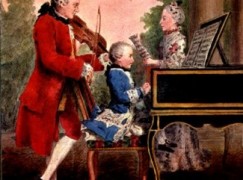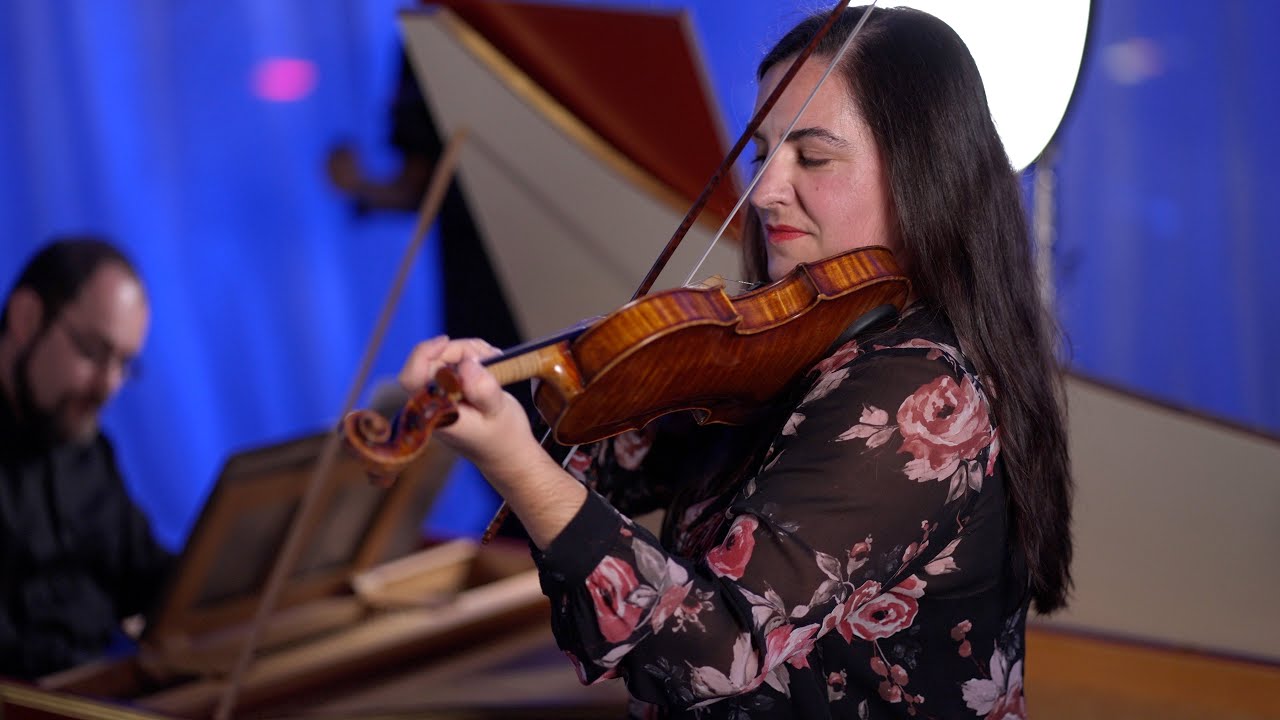‘Mrs Bach’ author now claims Mozart’s sister wrote his music
mainThe Australian professor who put about the claim that Bach’s cello suites were written by Anna Magdalena Bach is now claiming that Maria Anna Mozart may have composed some of her brother’s music.
‘We know that Maria Anna composed but no one has ever been able to identify the music written by her,’ Martin Jarvis, of Charles Darwin University, told the Daily Telegraph. ‘Now we have identified her musical fingerprint, we can look for music in her hand and see whether there is evidence of her helping her brother. What is distinctly possible is that with the works of Wolfgang Amadeus, she may have had some involvement in it – particularly the earlier pieces. We have not found evidence of it yet.’






There used to be a mad old character who would walk up and down the Prom queue every night claiming to have written all the music on that evening’s programme. Perhaps Mr Jarvis should investigate him as well, and then join him in the same home for the bewildered.
“We have not found evidence of it yet”
It amazes me how you can twist that sentence into “claims Mozart’s sister wrote his music”.
https://www.youtube.com/watch?v=nQSfFzwSZ4k
According to the ‘Stürmische Beobachter’ of yesterday, last week a research team at the Music Faculty at Nibelheim University has, after 12 years of extensive examination of manuscripts, discovered that a first version of the 2nd movement of Beethoven’s 1st piano concerto was, in fact, written by his mother during a prodigy concert trip to Rotterdam (Netherlands) in 1781. Also it appeared that the ‘Presto ma non assai’ in the 3rd mvt of the 2nd symphony of Brahms was composed by his younger sister Heike, which according to the leader of the research team, Dr. Adolf Holzbauer, could be deducted from the obstinate character of the music, forming a stylistic breach with the rest of the gentle movement. Not content with the quantity of the findings, further investigations at Nibelheim brought to light that the ending of Wagner’s ‘Meistersinger’ was created by his wife Cosima, and that half of Mahler’s songs were written by his sister and the other half by his wife, Alma (including the intense ‘Verwirrenes Ständchen’ of 1898). Not to be outdone, IRCAM in Paris proclaimed on their website this morning that the piano version of Boulez’ masterpiece ‘Notations’, which was thought to have been composed shortly after WW II, was in fact the work of his sister Amélie and fruit of her involuntary seclusion in a mountain barn in the Aubergine, where she had fled for the Germans as a member of the résistence.
Music history will have to be entirely rewritten.
Intensive textual analysis strongly suggests that John Borstlap’s mother wrote this.
True!! How did you notice??!!
The reference to an aubergine. No real man would know the word.
John told me it was a wrong word, always wanting to know better, but this time he might have been right. I meant the Auvergne.
Heh, you two. There’s obviously secret encoding going on (with esoteric vegetable symbolism). I would suggest you decode this because there’s un-doubtably somewhere in Switzerland, in neutral territory from the war of the sexes, some bank account whose numbers correspond with these yet to be un-coded numbers. There you could find more information.
If it’s the Aubergine, it must be an allusion to Parma, but surely Verdi was fully capable of writing his own stuff. (Or so say my sauces.)
I found out today that Barack Obama is actually NOT the president of the USA.
The true president is actually Michelle Obama.
To begin with, the article doesn’t say that Nannerl wrote Wolfgang’s music, it says they identified her handwriting in a notebook for her that Leopold put together, and she could have written some of the music in there. Then it goes on saying it would be tantalising (sic) were she more involved with his music.
I don’t think that Anna Magdalene wrote the cello suites.
As a woman, she would have not been allowed to, and we don’t even know whether, if given that chance, her work would have been even better.
But I don’t think it’s at all improbable that Nannerl could have written some of the pieces in the notebook put together for her, especially since they are written in her hand.
And also given the amount of ABUSE and OPPRESSION towards women who dared to do ANYTHING but be a man’s possession and bear them as many children as they could pump out of them; it’s quite understandable that someone might go a bit too far trying to show women might have been involved a bit more than is made out. Granted, this gets to be a bit all to far in regards Bach, but never the less….
What’s also quite evident, I think, is how much Wolfgang’s mother contributed to what allowed him to express the irrepressible softness of humanity that can be found there. Without her, there might be less of “Mozart” that remains than were Leopold not there, although she had to take on that name.
We KNOW that Camille Claudelle actually sculpted a lot of Rodin’s work, under his instruction, but still the work was hers. Look where she ended up, as a woman.
And I also don’t have such a repulsive response as others in regards someone who is “mad,” stating that he wrote all of the music in some program where everyone is so well mannered it’s unlikely they might have anything to do with the whole repertoire, of which most of the creative minds have indeed also been blessed with a diagnosis as well, only posthumously.
It gets to be REALLY SOMETHING when people use as an object great art, and then make out it was brought into existence by a hand so inhuman and above it that anyone who dares to bring their own art into being can be ridiculed by the same people who wouldn’t make themselves vulnerable to express anything accept that fill-in-the-blank-of-great-artist’s-work is so great they can find fault with anyone else’s. That someone would say another wrote it might be more of a guidance (an escape, a squeeze, a pinch) how it came into being than most of the whole bulk of material and ideology stating otherwise and backed up with empirical evidence, which in contrast to any creativity outweighs it to such an extent anything creative is catapulted right pluck where the cow ended up, before the plate took off in elopement with another piece of kitchen paraphernalia that might have been used as yet another tool for dissection.
https://en.wikipedia.org/wiki/Nannerl_Notenbuch
If we know one thing about Camille Claudel, it’s how to spell her name. Do try to be a little more convincing…
“You can tell the difference in his sculptures before and after Camille appeared in his life. Also, there are some works which we don’t know if Rodin or Camille made; they are not signed but show signs of being made with four pairs of hands, by both of them.”
By focusing on figurative sculpture – sometimes nude – Claudel attracted public outrage. Griselda Pollock, professor of social and critical histories of art at Leeds University, confirms that Claudel was “a major force in the experimental and transformative partnership that occurred artistically in Rodin’s studio”; yet her work was subject to gendered censorship.
“For instance, to get a clay maquette made in bronze you needed the funding and the approval of the official Institut. When the inspectors visited Claudel’s studio, they refused to give her permission to cast The Waltz because it showed two nude bodies in close proximity. The very idea was not acceptable from a woman’s hand, whereas from Rodin’s hand, work influenced by Claudel’s daring, became acceptable as men are allowed to know about sexual desire and the body.”
http://www.independent.co.uk/arts-entertainment/art/features/how-rodins-tragic-lover-shaped-the-history-of-sculpture-8026836.html
Interesting & shocking.
Debussy preferred Claudel’s work to that by Rodin. Debussy’s music is very feminine, but that was acceptable because written by a man. No wonder women got hysterical during the Fin de Siècle and had to frequent Freud’s sofa.
You would have to bring up Freud. And this is already way off topic, except that it deals with what women had to deal with. Even on his “sofa.”
I just read a whole expose how, in his (Freud’s) famous case with Dora (pseudonym). He took a vulnerable 18 year old girl who had been repeatedly propositioned by the husband of the woman the girl’s father was having an affair with, along with other tedious details regarding covert behavior amongst the “adults”. When she found this distressing, Freud’s “help” to her was to make out that she was in love with this man who disturbed her, in fact he made out she was in love with all the adults behaving quite uncouth, just about or some such convoluted psychologized motive, and that she was in denial. Freud wanted her to marry the man that was married to the woman her father was having an affair with (can you even follow this!?). His whole “penis envy therapy” also comes from him so often having women that were sexually abused, that instead of acknowledging this when it might have caused political trouble, he made up this supposed archetypal condition. And the one reason he was actually put on a pedestal, I read in Jeffrey Moussaieff Mason’s book Against Therapy is that Freud was able to actually put these convoluted ideas clearly into words, and compared with the analyses of other therapists, they read well.
Good lord, years from now we’ll hear about how Mrs. Stockhausen wrote some of her husband’s music….
You may be on to something. Stockhausen’s domestic situation was a tad unorthodox.
An unkind person might opine that, with that sort of music, it’s a miracle that Stockausen had a wife at all.
He picked them very carefully from the palette on offer, and put them first through an examination process: if they got neurotic enough by listening to ‘Gruppen’ they were approved of.
Next he’ll be saying Clara re-wrote Robert’s music . . . to make it worse.
However, it was Mrs Schumann who pushed her husband to become ‘classical’ and write Beethovian symphonies, which went somewhat against his natural talents.
Considering all the musicians, down through the ages, who learned music or supported themselves by copying scores, the mere presence of a codicological autograph can’t always be taken at face value. Case in point: Sometime in the ’70s, a new piece of piano music was uncovered that appeared to bear Schubert’s name. (I no longer recall the title — was it “Fantasies/Soirees de Vienne”??) Theories of authorship were rife and contentious. It rose to such a boil that Max Ferguson presented the story as a news skit on his CBC morning show. It featured a newscaster interview with Walter Durr, then director of the Schubert Institute, followed by the sounds of an orchestra tuning up, and then going softly into the music, which swelled and swelled, until it reached the refrain: “Ol’ Man River.” “Ah”, exclaimed the Durr voice, “Not Schubert! ‘Showboat’!”
In regards someone mentioned: “a mad old character who would walk up and down the Prom queue every night claiming to have written all the music on that evening’s programme,”
I’m sure there are people who could get together with this “madman” and expand on his thoughts, bridging his need to take part in taking credit for a part of human nature, and it’s output, that perhaps he wouldn’t be allowed to be so vulnerable as to make it out to be of human origins; given those who would say what he has become (mad) could have nothing to do with it. But I don’t necessarily think Jarvis is capable of investigating this in such a manner. And sadly, I find it highly unlikely this would happen in (as again was “mentioned”) in what’s referred to as a home for the bewildered. As “bewildering goes. Having to adapt to the definition of what a woman was in “those times” might be equally “bewildering.”
There has already been quite rigid logic showing that this supposition is wrong that as Norman puts it “Mrs. Bach” wrote the cello suites. A plethora of sarcastic responses, as if an abundance of ridiculing – the same you might encounter in the manner of bullying one sees at a playground – this doesn’t supply any logic as to why “Mrs. Bach” wouldn’t have written the suites, in fact it supplies less logic than Jarvis put forth that she did.
It has also become sad, that when a woman (as Ruth Tatlow did) points out how she feels a man has misinterpreted this idea of making Anna Magdalene out to be a composer, how closer scrutiny has great difficulty with it; that her statement again is misused itself as an excuse to make out petty ridiculing determines validity. Something much more in line with the mistakes in logic Jarvis made rather than her points. As if A can’t be because I find it as ridiculous as B makes a point, although it’s the same lack of scientific investigation of presumptions or assumptions that litter Jarvis’ work. And I do find that this takes away, once again, from the theme apparent, of what it was like to be a woman in those times.
Instead of the marketable intrigue, It might have been more productive for Jarvis to use the publicity machinery he has in order to promote the work of yet neglected female composers, where it is known beyond a shadow of a doubt they were the composers themselves.
http://www.bachnetwork.co.uk/ub10/tatlow-pre-release.pdf
Perhaps I am lost in translation but “write” the music is not the same as “compose” the music. I have no doubt that his sister could help him as copist of some of the manuscripts.
Indeed… In those times, when music printing was a rare and costly affair, copying music was a wide-spread custom and important part of any music education.
The laudable attempt to give more attention to female composers can have unforseen consequences. Once, a German soprano smuggled a song cycle from my hand into a concert dedicated to the other sex, by changing my name into Joan. She had quite some success with her songs and thus contributed to feminism.
You mean like “Mendelssohn” when presenting a collection of his songs to the queen and her choosing as her favorite one that Fanny Mendelssohn had actually written, and Felix published as his own. This is after he advised her not to publish, because she was just a vulnerable woman, and wouldn’t know what kind of a world she would get into.
Just think of all of the difficulty you could have been spared.
And I forgot to mention that Felix only turned red, asked the queen to chose another song, and didn’t acknowledge the true author.
It’s truly awful to think of the infinite trail of humiliation female artists had to endure. Strangely enough, female painters did not seem to have so much difficulties, like Elisabeth Vigée-Lebrun who had a court position and painted a famous portrait of Marie-Antoinette.